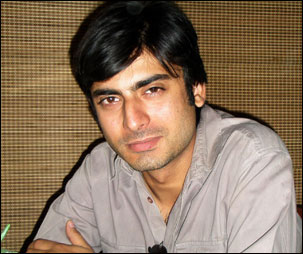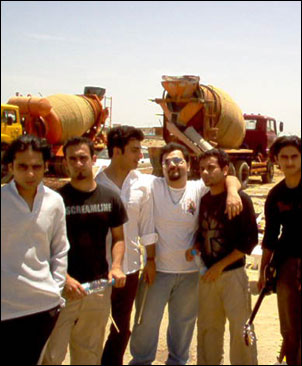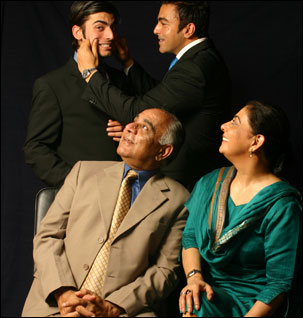|
|
| |
instep interview
From the death of rock to life after Khuda
Kay Liye
Fawad Khan waxes eleoquent on a life come full circle He is
the flavour of the moment with the country having embraced him
as an actor more than they did as a singer.
Fawad Khan has been reborn after the demise of EP and how! Here's
looking at the new kid on the acting block whose film debut is
as unconventional as his singing has been.
By Sonya Rehman
|
| |
The
first time I'd ever heard Fawad Khan's name was a little over five
years ago – when amidst a succession of harrowing A' level days
between 'all-nighters' - that involved law and literature, syllabuses
and timetables – two of my batchmates confessed to having serious
crushes on "that EP guy".
Fast forward a couple of years later, and one batchmate got hitched;
the other progressed overseas for a 'higher' education, EP disbanded,
Fawad too, eventually, got married and out came his debut in the film,
Khuda Kay Liye.
So here I am at Coffee, Tea & Company (in Lahore), with a recorder,
notepad full of questions, doodles, and camera at bay, ready to interview
"that Khuda Kay Liye guy". |
 |
| |
The
road outside the café is an absolute mess – dug up chunks
of it (in gravel form), along with tiny hills of muck and earth lie
slapped on either side. And if you forget to roll your window up whilst
driving through it, there's a ninety-nine point nine percent chance
a pebble will strike up against your car door and then ricochet off
- to eagerly bonk your forehead - in the sadistic hope to make you
see little tweetie birds (in tutus) doing the Cha-cha-cha.
And just about near the curb, there's a man in an inter-galactic-looking,
bright orange jumpsuit driving a mammoth-sized steamroller over the
opposite road. He dons a yellow cap and he's as dark as the ace of
spades. In a Steven Spielberg science fiction, this would've been
an ideal setting for 'E.T lands in Lahore'. But then again, E.T would
never land in Lahore – far too much red tape – heck, the
Sharif brothers have already been issued stacks of arrest warrants…E.T
ol' boy has a hope in hell.
Fawad finally arrives. |
| |
Instep: Okay
before we talk about the film, let's just re-cap a bit…what
happened after EP and more importantly, what's the status with your
recording studio?
Fawad Khan: Well, immediately after EP, I'd signed up for some projects
related to TV. The advertisement game is pretty old, as in, it's always
been the same thing…its easy cash and very one-off, you go shoot
an ad, and you're done. The major change in my life after EP however,
was the recording studio that falls under me and two partners; Hassaan
(from EP) and this other architect friend of ours, Awais Khan. It
took around a year to complete and now we've decided to begin working
with bands and start recording.
Instep: So what sort of bands are you hoping to work with –
what genres of music? Anything in particular or anything at all? |
 |
| |
FK: Oh anything
at all! Because what I feel is, and I'm sure a lot of people would
agree with the fact that music is lacking production quality in our
country. I mean you can tell the difference in quality when you listen
to a music CD from Europe, India or America in comparison to CD's
recorded here in Pakistan. There's a huge difference. Half of the
music recorded here isn't a hit mainly because of the way it sounds
when played.
Instep: Okay but let's look at it this way – Mekaal Hasan
really got to where he is today after years of work as a producer…venturing
into production, don't you think in a way you'll be stepping out of
the limelight, and in a way it'll also be hard making a name as a
producer?
FK: It would. Because production does take a lot of long hours, yes
there are trade-offs…whether I'll be doing other people's music
or my own…but the main thing is this has been my passion for
a very long time. I may not call myself a full-time producer or recording
artist, because if other projects come my way, I may have to take
a little time off. |
 |
| |
Instep:
So is the recording studio sort of like a safety net?
FK: No that's the thing; it's not a safety net at all. That's where
it gets a little complicated because recording has always been one
of my greatest passions and it's not as if I've started only just
now even on EP's album, I was down on the mixer and producing as well
– majorly. Tweaking the drum sounds, making the drum sounds,
stuff like that so it's not a safety net, just a passion I'd like
to pursue.
Instep: And what about pursuing your own solo music career? Are you
giving that some though?
FK: Actually I'm so-so on that, reason being, as serious as I may
be, I don't think I should put the news out there right now and then
get embarrassed when 6-7 months down the line people ask 'where's
the album'? I intend to fully put out a solo album but I just don't
want to announce it right now.
Instep: Yeah, I guess announcing it will resort to major expectations
from people and then the anguish of a cut-off date, deadlines etc…
FK: Exactly, so better to just keep quiet and get it done with.
Instep: One question about the solo music career though –
what genre do you think you'll venture out into when you eventually
decide to cut an album?
FK: I'd like to focus on folk music – I mean even though
I'm not very experienced in that genre of music, but I really like
it. We used a lot of ethnic instruments during EP, but rock music
isn't our culture – it isn't very convincing somehow folk music
on the other hand is convincing because it stems from our culture,
our heritage. And if you fuse it intelligently with western instrumentation,
it sounds great. |
| |
Instep: Okay
now onto Khuda Kay Liye…how did it come about? Who approached
you?
FK: What happened is, before the movie's shoots began, a friend of
mine (Bilal Lashari) was assisting Shoaib Mansoor and one day he rang
me up and said: 'Yaar aik movie ki shoot start honay wali hai so why
don't you come down and give an audition'? And around that time there
was a lot of hype about the film – everyone knew that Junaid
Jamshaid and Ali Zafar were due to feature in it…but nothing
was finalized just yet. So I went immediately after I'd gotten engaged
– and around that time, I was this big (fat) ball – so
I went and met him but his objection was that I was a little...uh…fat.
Instep: Fat?! But you're far from fat!
FK: At that time I was…my waist had gone upto about 38 inches.
So he [Shoaib Mansoor] took one look at me and said: "You look
fit to play the role of a grandfather!" |
 |
| |
Instep:
He said THAT?!
FK: That's not he said exactly, but that's what he meant and that's
how I interpreted it. So anyway, he goes; okay then we'll meet some
other time perhaps for another project or something. So I said sure,
shook hands with him and walked off.
Instep: Were you disappointed?
FK: No because I hadn't gone in with any expectations…it was
totally on the spur of the moment and was all very spontaneous. Anyway
I went back, and around that time I was working for the Kashf Foundation,
but then six months down the line…once the shooting of the film
had started, I got a call from Bilal asking me to come back since
Ali Zafar had quit. And so I went back, and three days before the
actual shoot was to begin, I got my script and we just started. That's
it. And infact by that time I'd lost weight and when Shoaib saw me,
he was like: now you look fine!
Instep: When all of you were in the midst of recording, did you
guys realize how big the film was going to be? Because till today
local cinema houses showing the film are still being booked in advance
with its tickets being sold out…
FK: Actually no we didn't know that – but the two very
big reasons as to why it's been so big is yes, the film's content,
and more importantly, the marketing and promotion of the film. I didn't
have any doubts of it being any less that good since it had Shoaib
Mansoor's name associated with it but I didn't know what the outcome
would be.
Instep: In comparison to Jutt & Bond, what was your experience
like as an actor between the sitcom and Shoaib's film?
FK: Jutt & Bond was a very loud, slapstick TV sitcom. And
(chuckles), Khuda Kay Liye is a dead serious film! That's a really
weird comparison (laughs) why'd you come up with that?!
Instep: No no, because you took a whole 360 degree turn –
from a comedic character to a role which is very intense!
FK: Yeah but Jutt & Bond was six years ago and it was just
all of us friends 'working' and having fun together…but I was
a little thrown off balance because I'd done the sitcom years ago
and now I had to face a 35mm camera, don a beard and had to look like
a very serious person. That was the challenge I guess, and yes I was
nervous…it got my knees knocking, because you're hearing the
camera's roll and everyone's looking at you – dead quiet and
dead serious waiting for you to say your lines. Shoaib was also conservative
about having re-takes and so surprisingly our take ratio was something
like one to one.
Instep: Did you all actually go to Afghanistan for that particular
scene in the movie?
FK: It wasn't Afghanistan but a beautiful place called Parachinar
somewhere near Abottabad – it actually hits the Afghan border.
And yes we were scared witless at a point, when we heard that a moulvi
in the local mosque had announced a fatwa against us there. They didn't
know what we were shooting though but they got very ticked off when
we were around… they tolerated it for seven days and luckily
the day they'd announced the fatwa, we had packed up and were ready
to leave.
Instep: What about the women – those three little girls
who were in the village scene?
FK: They were actual actors from Peshawar.
Instep: Was the entire filming process very tiring?
FK: Yes it actually was very tiring… because we had been shooting
the film for like; two years… the reason being that something
or the other would always go wrong. But the actual shooting of the
film was only two months.
Instep: And in addition it took a whole year of editing right?
FK: Not just the editing, also the 'washing' of the film, putting
it together, then editing it, the sound, the dubbing, yes it took
in totality about three years. And on some level, we had stopped anticipating
the film's release…uptil the last day. But yeah after I saw
the film at the Karachi premier, I was overwhelmed.
[At this point Fawad looks at the window worriedly.]
Instep: Don't worry, that isn't an earthquake…they're making
the road outside…it's the steamroller!
FK: Yeah that's what I was wondering.
Instep: There's this particular scene in the film where you throttle
this guy with a gun – how did you prepare yourself for 'getting
into the mood' and making that come across as 'real' rather than just
'acting'?
FK: Well first of all it was as hot as hell and automatically (laughs)
it made me exhausted…but on top of that…I just put myself
into the character's shoes and performed.
Instep: And what feedback have you gotten from your friends and
family about the film so far?
FK: Of course they're all pretty happy for me – but it's not
as if I've conquered some big moral issue…I mean there was a
time when [the issues brought up in the film] got to me, but now I've
just stopped feeling that way, because what's meant to happen, will.
I mean when you have a system that's politically challenged, getting
into a whole debate about it is pretty pointless to me.
Instep: I know this sounds so clichéd – but the film
does portray a clash of ideologies, what's your take on this?
FK: A clash of ideologies, sure – but the 'moderates' who've
been objecting to the clergy and having certain notions about the
'mullahs' and imposing things on them, why then, are the liberals
being hypocrites by saying that the orthodox are impressing upon them?
It works both ways. It's like you're responding in exactly the same
manner as they are by stating: what we're saying is right, and what
they're stating is wrong. So basically, the 'moderate Muslim' is also
a mullah. My whole take is that we should quit pointing fingers and
blaming each other – just cut it at that yaar…end of story
and live peacefully.
Instep: Were you nervous about the fact that Khuda Kay Liye was
released as the Lal Masjid siege was being wrapped up?
FK: Yes! I was. Especially when I heard that the mosque had raised
a fatwa against the film. And uptil now in totality we've gotten 3-4
fatwas, so we're pretty used to it, if we get another one now, we're
like: oh okay!
But yeah at that time I was nervous because I thought people would
react badly to the film but nothing happened. Pakistanis aren't as
'animalistic' as the Western media portrays us to be.
Instep: Last question, what's the status of rock music in Pakistan?
FK: Rock in Pakistan is dead. |
| |
|

